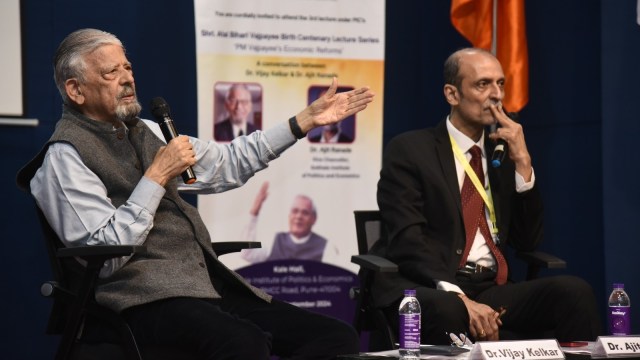Click here to join Express Pune WhatsApp channel and get a curated list of our stories
Former PM Atal Bihari Vajpayee was a liberaliser, believer in consensus: Dr Vijay Kelkar
Dr Kelkar, Chairman of the 13th Finance Commission, was participating in the third Atal Bihari Vajpayee Birth Centenary Lecture at Pune’s Gokhale Institute of Politics and Economics (GIPE).
 Dr Kelkar, while participating in the third Atal Bihari Vajpayee Birth Centenary Lecture at Pune’s Gokhale Institute of Politics and Economics (GIPE) on Monday. (Express Photo)
Dr Kelkar, while participating in the third Atal Bihari Vajpayee Birth Centenary Lecture at Pune’s Gokhale Institute of Politics and Economics (GIPE) on Monday. (Express Photo)Recalling the game-changing impact of the Vajpayee government’s key initiatives such as the Golden Quadrilateral Highway Project and the PM Gram Sadak Yojana, Dr Vijay Kelkar, Chairman of the 13th Finance Commission, has said that former Prime Minister Atal Bihari Vajpayee was gracious and a liberaliser.
Dr Kelkar, while participating in the third Atal Bihari Vajpayee Birth Centenary Lecture at Pune’s Gokhale Institute of Politics and Economics (GIPE) on Monday, said that the former PM was a believer in consensus, even as he headed a government that had 23 coalition partners.
The renowned economist, who served as the finance secretary and advisor to the Finance Minister in the Vajpayee government, stressed that the former PM’s economic policies laid the foundation for India’s high growth from 2004 to 2010.
Titled ‘PM Vajpayee’s Economic Reforms’, the event featured a conversation between Dr Kelkar who is also the vice-president of Pune International Centre (PIC), and Dr Ajit Ranade, Vice-Chancellor, Gokhale Institute of Politics and Economics.
“The diplomacy and economic policies of former Prime Minister Shri Atal Bihari Vajpayee successfully steered India through the years when it faced diplomatic challenges following the Pokhran nuclear tests in May 1998,” Dr Kelkar said.
Dr Kelkar highlighted that Vajpayee’s initiatives such as the Golden Quadrilateral Highway Project and the PM Gram Sadak Yojana significantly enhanced India’s infrastructure and productivity. He said the Vajpayee government’s sectoral reforms, such as in roadways, telecom, electricity, transport, all of which are network industries, gave enormous boost to India’s productivity.
He said the Vajpayee government’s introduction of the Fiscal Responsibility and Budget Management (FRBM) Act of 2003 was a pivotal step towards improving fiscal governance.
He highlighted Vajpayee’s efforts towards making institutions transparent and independent, particularly through the establishment of three important economic institutions: Disinvestment Commission, TRAI (Telecom Regulatory Authority of India), and the autonomous National Statistical Commission to recommend reforms.
Dr Kelkar also pointed to the changes in trade tariffs, increased foreign direct investment (FDI) in insurance, reduced capital gains taxes, and the strategic use of disinvestment as a tool to foster competition as significant reforms under PM Vajpayee.
On the social policy front, Dr. Kelkar remarked that Vajpayee’s approach was “Rawlsian,” aimed at maximising the minimum, where raising the lowest segments of society leads to the uplift of all.
GIPE V-C Dr Ajit Ranade noted that the Maruti IPO and various corporate reforms under Vajpayee’s leadership have been understated in their significance.
The conversation also noted that agriculture remains a largely unreformed sector in India to this day.
Abhay Vaidya, director, PIC, made the opening remarks.
Click here to join Express Pune WhatsApp channel and get a curated list of our stories







